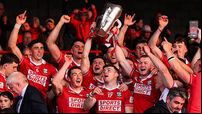Billy Morgan: From the original Stephen Cluxton to the Brian Clough of Cork football

To paraphrase Nick Hornby’s timeless line about Liam Brady’s relationship with Arsenal, if you cut Billy Morgan he would bleed Cork.

By the time he played in his second decider in ’73, Morgan was captain. That honour came by virtue of Nemo winning their first county the previous autumn, and his role in that victory was, inevitably, outsized.

Upon graduation from UCC, he’d supplemented his teaching qualifications with a physical education degree from Strawberry Hill College in London.
The club’s faith in him was rewarded as, wearing the twin hats of captain and coach, he led that side to their first All-Ireland club title. Thirty-one years later, he guided another Nemo team, most of whom weren’t even born then, to their seventh crown.

"So, with Nemo first and then my Cork colleagues, I worked on and developed the short to an unmarked team-mate.”

“I thought then I’d love to play for him.”

“The equalising point Meath got in ’88 (from a free), and in ’93, Anthony Davis’s sending-off, which was rescinded after the game.”

That he remains ageless was shown in 2019 when he led UCC to yet another Sigerson Cup triumph over St. Mary’s. At the finish of that game, the players wearing red and black with the skull and crossbones on their chest, were swarming around him, each one of them seeming determined to seek him out for an embrace in their moment of victory.










 App?
App?







